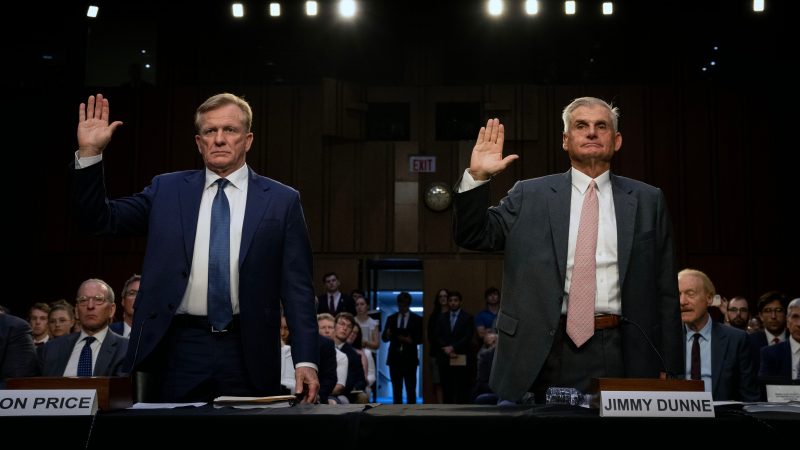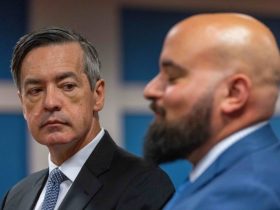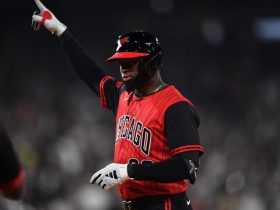Sen. Roger Marshall (R-Kan.) winced at the hypothetical question about his favorite professional team: Would he object if a Middle Eastern-backed investment fund bought an ownership stake in the Kansas City Chiefs?
Marshall, who grew up to the west of the reigning Super Bowl champions, wasn’t sure what to think. “As long as it’s not a national security issue, I don’t have any bells going off,” he said, “but I think I would have to study it a little bit deeper to see, well, what am I missing here?”
Marshall’s answer came late Tuesday, a few hours after the Senate’s Permanent Subcommittee on Investigations wrapped up a long hearing examining the Saudi Public Investment Fund’s attempted merger with the PGA Tour after more than a year of bitter rivalry.
The hearing, led by Sen. Richard Blumenthal (D-Conn.), more than served its initial purpose in shining a light on the controversial reversal by golf’s leading professional association to join arms, and checkbooks, with its rival.
A 265-page report, summarizing preliminary findings of just a couple weeks of probing, highlighted the degree to which PIF governor Yasir Al-Rumayyan wants to be considered a member of the world golf elites: He proposed tournaments that would culminate with a championship event played in Saudi Arabia, and he coveted a membership at Augusta National Golf Club.
But the subcommittee’s report and initial hearing are missing the scope of what’s happening before the eyes of American sports fans.
“Sportswashing,” as the term is known for authoritarian regimes looking to get their image rehabilitated, has crashed ashore here in the United States in more ways than Washington’s leaders recognize. With no effort to set official parameters, these foreign sovereign wealth funds — stocked with hundreds of billions of dollars derived from oil fields — will soon take on a very big role in U.S. sports, maybe even with Super Bowl-winning NFL teams.
“This is the next frontier of foreign influence,” Ben Freeman, a research expert on foreign influence at the Quincy Institute for Responsible Statecraft, said in an interview.
After a decade or more of investing in European sports, these private funds are ramping up their American presence, with a real focus right here on Washington sports.
The Citi Open, one of America’s premier tennis events held every August since 1969 about three miles north of the White House, has been renamed the Mubadala Citi DC Open. It reflects a merger with a women’s tournament in San Jose that will make for a stronger field here in Washington — as the event’s lead sponsor is now the $276 billion sovereign fund managing assets for the United Arab Emirates.
Following the NBA decision in December to allow such government-backed funds a 20 percent stake in their teams, Washington’s Monumental Sports & Entertainment group announced that it would sell a 5 percent stake to state-owned Qatar Investment Authority.
Monumental owns the NBA’s Washington Wizards, the NHL’s Capitals and the WNBA’s Mystics, while The Washington Post has reported that CEO Ted Leonsis has offered $2 billion to the Lerner family to purchase MLB’s Washington Nationals.
If the Qatari funds are approved, there’s no telling when their stake could increase further, providing more fluidity for Leonsis to put money into purchasing the Nationals and rebuilding the team that has fallen far from its 2019 World Series championship.
While Qatar’s human rights record may be a step above the Saudi kingdom — where orders went out to assassinate Post columnist Jamal Khashoggi and where opponents of the monarchy face brutal prison sentences — homosexuality is illegal in Qatar. Human Rights Watch last year reported on the detention and beatings of LGBTQ+ people, while security forces required transgender women detainees to undergo conversion therapies.
In the UAE, arbitrary detention and torture have become common, as well as other moves against gay rights.
What happens once the top sports franchises and events in the nation’s capital, the supposed leader of the free world, are selling off shares to these autocratic wealth funds? And when the Saudi PIF can become the biggest revenue stream for golf across the globe?
The dam will break.
“If we’re going to be selling out to countries that can throw around hundreds of billions of dollars, we’re going to lose not just financially, we’re going to lose in terms of our democracy and freedom and institutions like golf,” Blumenthal said toward the end of Tuesday’s hearing. “Sports are central to our society, to our culture, to our economy, to our way of life, to our self-image and our image abroad.”
But few other senior lawmakers seem to be as concerned about sportswashing and the pending burst of foreign ownership stakes in U.S. sports. The four Republicans who attended all gave their tacit blessing to the Saudi investment, which according to PGA officials would be “north of $1 billion” to start for a tour industry worth $3 trillion in revenue and assets.
They agreed with the PGA that the Saudi-backed competitor, LIV Golf, could simply go on for years losing money by paying ridiculous amounts to poach players and devaluing the PGA’s golf product to the degree that its traditional sponsors would pull away.
“Let’s give them the time and space to conclude a deal that can be actually a win-win situation for everybody involved,” said Sen. Ron Johnson (Wis.), the panel’s top Republican.
Sen. Rick Scott (R-Fla.) merely thanked the PGA officials for boosting his state’s economy with the roughly 10 tournaments a year held there.
Sen. Josh Hawley (R-Mo.) issued the rare condemnation of the Tour’s work with an autocratic nation committing human rights abuses — but his concern was with the PGA’s nascent dealings with China.
“You’re an evil regime when you treat your own people as slaves, and that’s what they’re doing. You are an evil regime. I don’t want to see American institutions co-opted by that regime,” Hawley said.
“Thank you, Senator Hawley. And that is exactly why we are here today,” Blumenthal said.
Marshall also condemned China for its attempts to change its image through hosting the Olympics, but he declared the golf merger not worth Congress’s time.
“No one back home,” he said, “has asked me, hey, why do you — what’s the Senate think about this merger?”
Other Democrats lacked the focus of Blumenthal. Sen. Alex Padilla (Calif.) used his time to push PGA officials to provide big compensation for the golfers who remained loyal and did not chase PIF’s extra millions from LIV. He also condemned the breakaway golf tour for not honoring labor union rights for production workers.
Sitting in the audience were members of 9/11 Families United, a group that lobbies for benefits for the survivors of the 2001 terrorist attacks. They used to be incredibly powerful — Blumenthal co-wrote the legislation that allowed them to sue Saudi interests who they think were complicit in the attacks.
Now, Blumenthal is at it again, but with fewer allies. He is upset that PGA officials did not fully pursue other major investment funds not run by autocratic regimes, like private equity, to provide the needed funds to beat back LIV’s challenge.
Blumenthal is planning additional hearings that will uncover more documents, with potential testimony from PGA golfers, but he is trying to drive home the point that this is only the beginning of the foreign influx in sports ownership.
The NFL is the rare major U.S. sports organization that has not allowed foreign funding or ownership stakes in their teams, so Marshall’s beloved Chiefs are safely in the hands of the Hunt family that helped found the team in the early 1960s.
Upon further review, he acknowledged he wouldn’t like anyone else owning the team. “I’d hate to see the Chiefs have anybody but the Hunts own the team,” he said.








